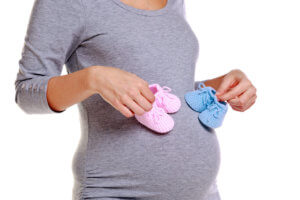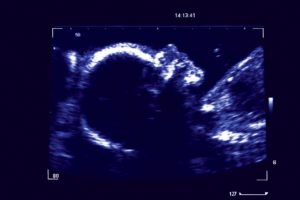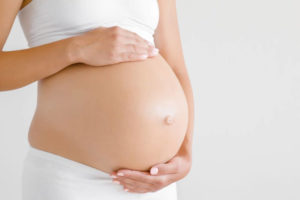The most ardent wish of many expectant parents is that their own child will be born healthy. Prenatal diagnostics is a controversial topic, because although parents have the opportunity to learn something about the health of the child, these examinations are not completely harmless. In this article you will find out which methods are offered in the context of prenatal diagnostics and whether complications can occur!
Table of contents
What is prenatal diagnostics actually?
Prenatal diagnostics basically refers to all examinations that are performed before birth. Through different methods during the examination, some diseases can be detected in your baby.
A prenatal examination can take away the fear of many parents. But one thing
first of all: this examination does not offer 100% certainty. Therefore, you should not rely exclusively on the test result of the examination.
What diseases can be detected by prenatal diagnostics?
Modern medical techniques have made it possible to detect possible diseases in the early stages of pregnancy. From a medical point of view, these examinations are used to detect the first signs of a disease and, if necessary, to start treatment.
Therefore, many expectant parents think that they can get certainty about the health of their baby. Unfortunately, this is a guarantee that prenatal diagnostics cannot provide. But which diseases can be detected at all?
- Chromosomal diseases/deviations , for example trisomy 21 (Down syndrome)
- Metabolic diseases (cystic fibrosis)
- Muscular hereditary disease (Duchenne muscular dystrophy)
- Neurological diseases
- Heart defects
- Deformities of the spine and spinal cord
What can’t be detected by this method?
As you already know, there are some diseases that can be detected by prenatal diagnostics. However, there is no guarantee. Even if a finding for a certain disease appears, it is far from being definitive proof that your baby actually suffers from it.
At what point does prenatal diagnostics make sense?
Many expectant mothers wonder at what point prenatal diagnostics should be considered. After about the 12th week of gestation, your baby is so far developed that abnormalities or malformations can already be detected in the womb.
Accordingly, your doctor can detect some abnormalities from this point in the pregnancy, if there is any indication.
Is this examination harmful for my baby?
Many parents-to-be have sleepless nights worrying about whether their offspring will be born healthy. And it is precisely for this reason that they see prenatal diagnostics as the perfect method to obtain final certainty about the baby’s health.
They hope for certainty from the examinations. However, a number of things should be taken into consideration: Disabilities, malformations, chromosomal damage or hereditary diseases can be detected with a certain degree of certainty, but not the actual extent of the impairment.
Accordingly, the following also applies: Even if your doctor could not detect any findings for a disease, this does not mean that the absolute health of your child can be guaranteed.
You should therefore consider the following points when considering prenatal diagnostics:
- Any type of prenatal diagnosis can lead to complications
- In fact, the probability of complications is higher than that for an impaired child
- A negative result can cause parents to fret and possibly lead to hasty decisions
In addition, amniocentesis can increase the risk of miscarriage.
What methods are used in prenatal diagnostics?
The tests that can be used in prenatal diagnostics are divided into invasive and non-invasive methods.
Here, the difference lies in whether or not an intervention actually needs to be performed.
Invasive methods
As you already know, invasive methods include examinations that involve an intervention. These include:
- Chorionic villus sampling
- Amniocentesis (amniotic fluid test )
- Umbilical cord puncture (chordocentesis)
Non-invasive methods
The methods that do not involve direct intervention tend to be preferred by most expectant parents, as they are considered to be relatively low-risk. However, these examinations do not allow absolute certainty about the findings.
While they can provide evidence of disease, they cannot provide a measure of impairment. Non-invasive methods include:
- Ultrasound
- Blood test
- First trimester screening
How do I handle a diagnosis?
Granted, the idea that you can get certainty about your child’s health with an amniocentesis or blood test is great. But what if the tests actually show a negative result?
After all, if prenatal diagnostics provide an abnormal finding, parents are faced with a difficult and stressful situation. Emotions such as shock, sadness or even anger are completely normal at this time and absolutely no reason to be ashamed of these emotions.
You may be particularly concerned about this question:
- Is further prenatal diagnostics necessary?
- Are there therapeutic options during pregnancy?
- Can surgery in the womb help?
- How severe is the child’s disability?
- What therapies are available after birth?
- What help and support services are available?
- How would life with an impaired child be managed?
It is best to think about how you can possibly deal with a finding even before the examination. In addition to medical measures, psychosocial counseling can also help you.
This is less about the medical aspect and more about your thoughts and worries. Counselors will support and advise you. Psychosocial counseling is free of charge and is offered in some pregnancy counseling centers.
Prenatal diagnostics – really necessary?
Of course, all expectant parents want a healthy child. Perfectly clear. For this reason, some parents resort to prenatal diagnostic examinations. These examinations can indicate diseases that have already developed in the womb.
However, as you have already learned in this article, these examinations are also associated with complications. For this reason, you should think twice about this decision.
If your doctor actually finds a result with the help of prenatal diagnostics, it is still not completely reliable. On the contrary, no result can determine the final certainty of your baby’s health.
Basically, the decision is up to you whether or not to go for prenatal diagnostics.
Sources:
https://www.netdoktor.de/schwangerschaft/praenataldiagnostik/
https://www.baby-und-familie.de/Schwangerschaft/Praenataldiagnostik-Was-kann-sie-leisten-350795.html
https://www.familienplanung.de/schwangerschaft/praenataldiagnostik/was-ist-praenataldiagnostik/
https://www.baby-care.de/service/faqs/vorsorge/praenatale-diagnostik/was-658













7 thoughts on “Prenatal Diagnostics: Controversial Tests During Pregnancy”